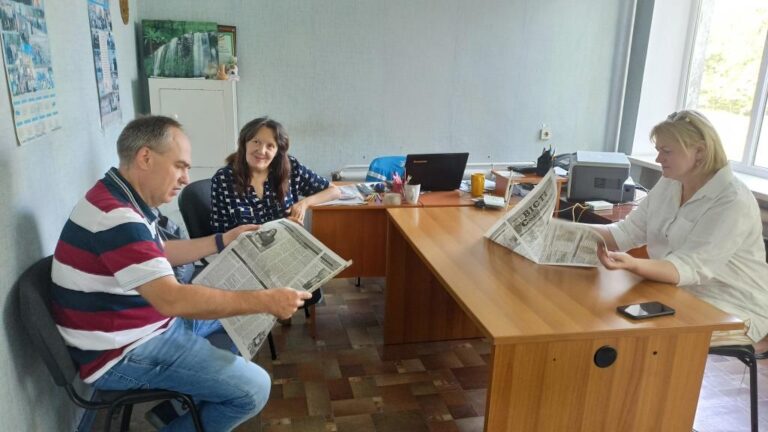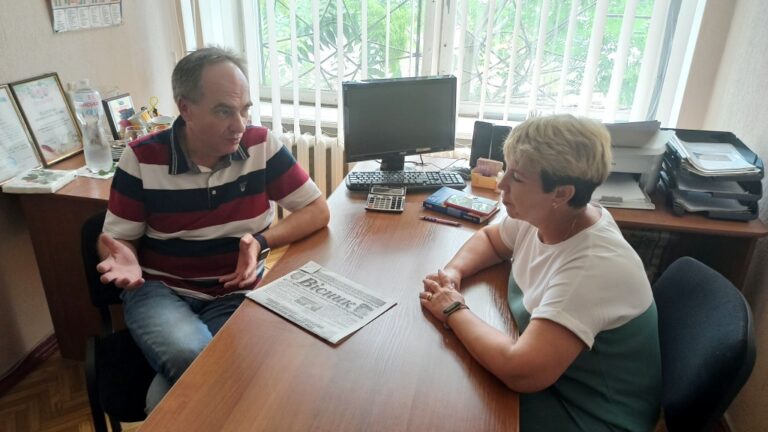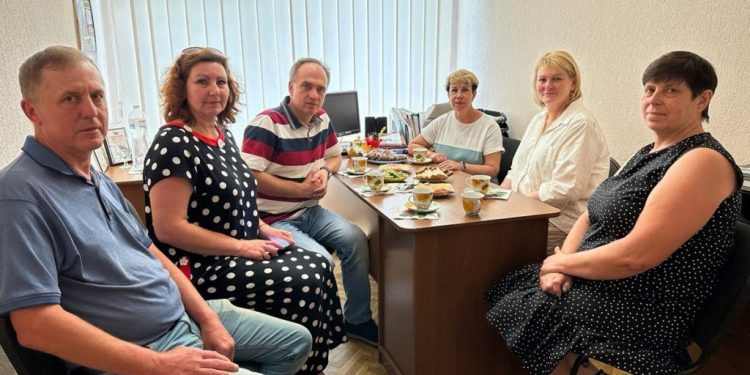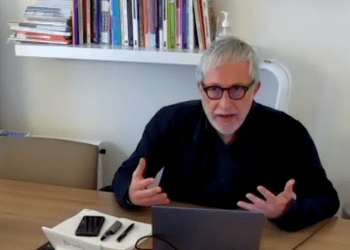The issue of why traditional publications need to have websites was discussed during a working trip to Kryvyi Rih conducted by the Board Chairperson of the Dnipropetrovsk regional organization of the National Union of Journalists of Ukraine (NUJU), Oleksii Kovalchuk, Executive Secretary of the regional organization, Svitlana Iotova; and the coordinator of the Dnipro Journalists’ Solidarity Center (JSC), Nataliya Nazarova. They visited the offices of the newspapers Visti Sofiivshchyny and Visnyk in the village of Shyroke.
The editor of the Visti Sofiivshchyny newspaper, Vira Kovaliyova, has not yet considered the creation of an online platform. In the newsroom, they work together with an accountant, so there is no one to run the site, and the Internet is not available in every community where the newspaper is distributed.
But Visnyk employees from Shyroke are planning to create their own website in the near future and use digital platforms for media development.
“If a newspaper has both a website and accounts on social networks, such resources increase the possibilities of attracting advertising: someone needs advertising in the newspaper, someone needs it on the Internet, and someone needs both. You need a website, create it, and don’t waste your time! It is also desirable to register the site in the National Council as a media; this is an additional opportunity to participate in tenders and contests. We hold the information front. The regional press must develop, adapt to digital realities, find new, unusual ways for most of us,” Oleksii Kovalchuk said.
During the meeting, they also discussed other urgent problems, in particular, financial stability and development, about new challenges and opportunities for local printed publications. Colleagues showed their interest in getting to know which of the former district newspapers were published, their circulation, and how to solve the issues with the delivery of periodicals. Today, local media are literally trying to survive. Newspapers have many problems and challenges. However, preserving their main informational role for society is important.
The problem with the Ukrposhta state postal service organization is very painful for newspaper journalists. After all, local newspaper teams, which sometimes consist of two employees, do their best to quickly inform the population about important events in the region and the country. The post office often delivers newspapers to readers with a delay and refuses to accept subscriptions. Union members unanimously supported the appeal of the NUJU Board to the President of Ukraine regarding the unsatisfactory operation of Ukrposhta, printed it in newspapers, and spread it via social networks.
Oleksii Kovalchuk shared his own experience of registering a printed publication in the electronic cabinet of the National Council in light of the requirements of the new law On Media. He advised not to postpone the registration and not to forget about the risks for newsrooms arising from the enactment of the new law.
Call the Dnipro JSC by dialing 050 919 8479 (coordinator Nataliya Nazarova). The Center’s address is 8 Starokozatska Street.


ABOUT JSC
The Journalists’ Solidarity Centers is an initiative of the NUJU implemented with the support of the International and European Federations of Journalists and UNESCO. The initiative is designated to help media representatives working in Ukraine during the war. The Centers operate in Kyiv, Lviv, Ivano-Frankivsk, Chernivtsi, Zaporizhzhia, and Dnipro and provide journalists with organizational, technical, legal, psychological, and other types of assistance.
ABOUT UNESCO
UNESCO is the United Nations Educational, Scientific, and Cultural Organization. It contributes to peace and security by promoting international cooperation in education, sciences, culture, communication, and information. UNESCO promotes knowledge sharing and the free flow of ideas to accelerate mutual understanding. It is the coordinator of the UN Action Plan on the Safety of Journalists and the Issue of Impunity, which aims to create a free and safe environment for journalists and media workers, thus strengthening peace, democracy, and sustainable development worldwide. UNESCO is working closely with its partner organizations in Ukraine to provide support to journalists on the ground.
The designations employed and the presentation of material throughout this digest do not imply the expression of any opinion whatsoever on the part of UNESCO concerning the legal status of any country, territory, city, or area or its authorities or concerning the delimitation of its frontiers or boundaries.
The authors are responsible for the choice and the presentation of the facts contained in this digest and for the opinions expressed therein, which are not necessarily those of UNESCO and do not commit to the organization.
Dnipro JSC information service

 THE NATIONAL UNION OF
JOURNALISTS OF UKRAINE
THE NATIONAL UNION OF
JOURNALISTS OF UKRAINE
















Discussion about this post